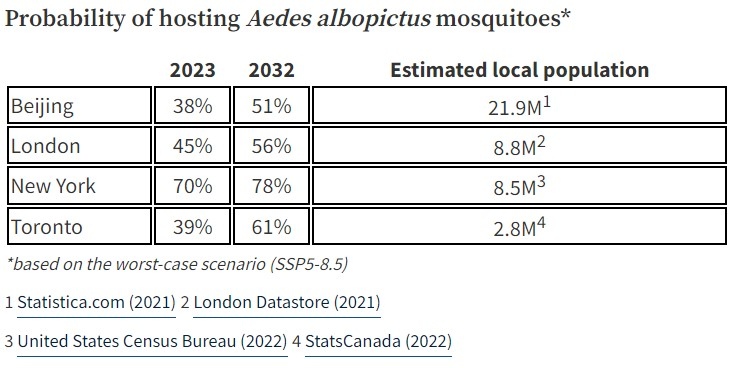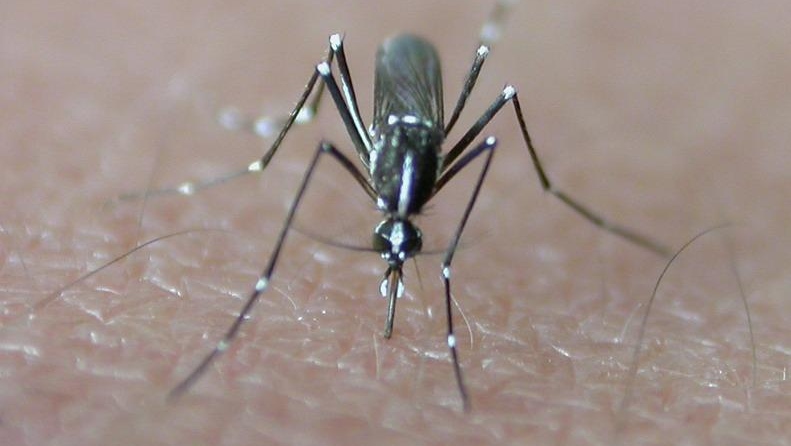Will the 'Tiger mosquito' bring infectious disease to Ontario? What you need to know
 Aedes albopictus, otherwise known as the Tiger mosquito, can be seen above. (Wikipedia Commons)
Aedes albopictus, otherwise known as the Tiger mosquito, can be seen above. (Wikipedia Commons)
A type of mosquito that can transmit over 20 pathogens known to be infectious to humans could soon inhabit southern Ontario, according to recent research.
New infectious disease modelling by Toronto-based company BlueDot suggests that rising global temperatures are causing Aedes albopictus mosquitoes, sometimes known as the 'Tiger mosquito,' to expand their global habitat boundaries.
Aedes mosquitoes are known carriers of Zika, chikungunya, dengue, yellow fever, and West Nile, among other viruses. Typically, they tend to live closer to the equator and are foreign to Canada due to the cooler climate and harsh winters, but BlueDot’s research suggests, “in the future, these mosquitoes will be able to survive and spread disease in new locations.”
The research predicts the species will expand its habitat 400 km north of New York State, into Canada, among other habitual expansions. Large urban dwellings likely to see increased populations of the insect include Beijing, London, New York, and Toronto.
Combined, these areas have an estimated population of over 40 million people.
According to the modelling, by 2032, Toronto will have a 61 per cent likelihood of hosting Aedes mosquitoes.
 Source: BlueDot Global
Source: BlueDot Global
In 2019, the Public Health Agency of Canada published a report warning that, as climate change progresses, previously foreign mosquitoes, specifically Aedes, may move into new regions within Canada, increasing the risk of mosquito-borne diseases.
“These mosquitoes have the potential to transmit over 20 pathogens that are infectious to humans,” the federal report reads. “The highly anthropophilic behaviour of [the mosquitoes] makes them two of the most medically-important mosquito species worldwide.”
The agency called for clinical and public health measures, including promoting awareness and use of mosquito bite prevention strategies, early detection and prompt response, ongoing active surveillance and mosquito control to mitigate the spread of mosquito-borne diseases.
 An Asian tiger mosquito is shown in this file photograph. (snowyowls / a href="https://commons.wikimedia.org/wiki/Creative_Commons"Creative Commons)
An Asian tiger mosquito is shown in this file photograph. (snowyowls / a href="https://commons.wikimedia.org/wiki/Creative_Commons"Creative Commons)
Thomas Tenkate, professor at Toronto Metropolitan’s School of Occupational and Public Health, told CP24 Thursday that, at this stage, he doesn’t think Torontonians need to be too concerned.
“We're really looking into the future and the impact of climate change on the temperatures, so I think [the study is] really forecasting that, across the world, there is the likelihood of the increased spread of diseases because the temperatures are going to create more favourable conditions for some mosquitoes and other insects,” Tenkate said.
The severity of the consequences of climate change that are felt will depend on the number of degrees of warming to come, he continued.
“If it's one or two degrees, and that's quite likely with climate change, it probably won't be as big a deal but if it's more than that, it could really impact us,” he said.
Kaidi Liu, Epidemiologist at BlueDot, wrote in the report that, ultimately, Bluedot’s research “underlines the need for education and procurement of medical or other countermeasures such as insect repellant, appropriate clothing or netting, and vaccinations.”
Liu writes that these resources are readily available and can help prevent the infection and the spread of mosquito-borne diseases.
CTVNews.ca Top Stories

Southern California wildfire destroys many structures; governor declares state of emergency
A wildfire whipped up by extreme winds swept through a Los Angeles hillside dotted with celebrity residences Tuesday, burning homes and forcing the evacuation of tens of thousands of people.
Trump is open to using 'economic force' to acquire Canada; Trudeau responds
Prime Minister Justin Trudeau said 'there isn’t a snowball’s chance in hell that Canada would become part of the United States,' on the same day U.S. president-elect Donald Trump declared that he’s open to using 'economic force' to acquire Canada.
A B.C. mom's real-life nightmare and the search to find her trafficked daughter
A Vancouver island mom shares the story of what happened to her teenaged daughter – and a warning for other parents about sex trafficking.
Liberal leadership hopeful Frank Baylis noncommittal on eliminating consumer carbon tax
Liberal leadership hopeful Frank Baylis says eliminating the consumer carbon tax alone will not 'solve the affordability issue for Canadians.'
Canadian naval vessel shadowed by Chinese war ship in the East China Sea
CTV National News is on board the HMCS Ottawa, embedded with Canadian Navy personnel and currently documenting their work in the East China Sea – a region where China is increasingly flexing its maritime muscle. This is the first of a series of dispatches from the ship.
Patient dies in waiting room at Winnipeg hospital
An investigation is underway after a patient waiting for care died in the waiting room at a Winnipeg hospital Tuesday morning.
Limit coffee-drinking to this time window to lower early death risk, study suggests
Drinking coffee has repeatedly been linked with better heart health and prolonged life. But the benefits of coffee consumption could depend on when you drink it, new research has found.
B.C. 'childbirth activist' charged with manslaughter after newborn's death
A British Columbia woman who was under investigation for offering unauthorized midwifery services is now charged with manslaughter following the death of a newborn baby early last year.
Man who exploded Tesla Cybertruck outside Trump hotel in Las Vegas used generative AI, police say
The highly decorated soldier who exploded a Tesla Cybertruck outside the Trump hotel in Las Vegas used generative AI including ChatGPT to help plan the attack, Las Vegas police said Tuesday.

































